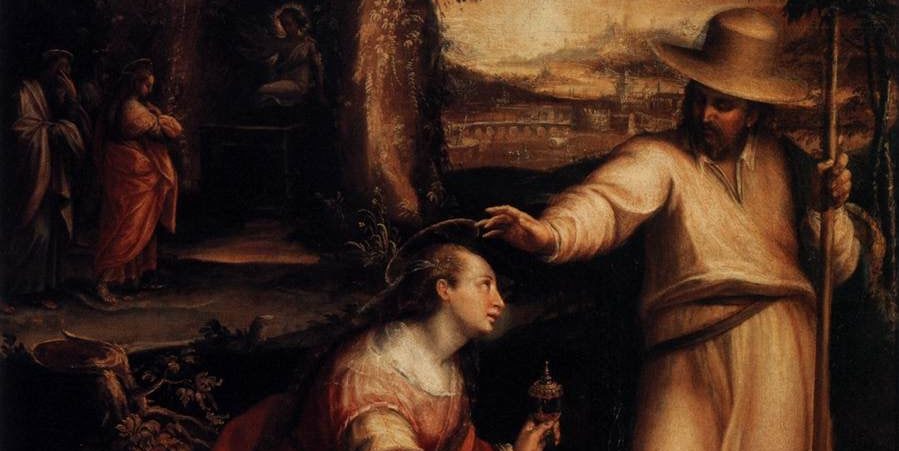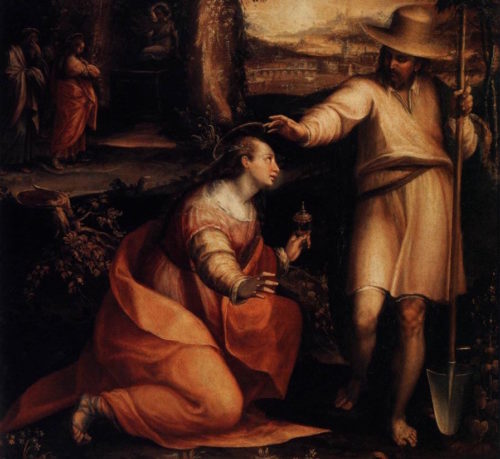
This one comes to us from Josh Musser Gritter:
I don’t have a green thumb. I couldn’t tell you the difference between a hydrangea and a hosta—nor did I know what a hosta was until I realized they were growing next door. If the Rabbi’s are right that Moses secured his calling when he “turned aside to see the burning bush,” then I know if God had picked me the Israelites would’ve been in Egypt another 400 years. I guess I’ve just never paid the soil that much attention. Well, let me tell you, I’ve been missing out. On our evening walks with our pup, Red (we call him the “pooch monster”), my wife points out to me the resplendent flowerbeds and the artistically crafted front yard gardens. As I watch her look so intently at the world, I am reminded that before God was almighty or holy or alpha and omega, God was a gardener. Translators have said that when God finished planting, God “saw that it was good,” but Ellen Davis says God looked and said, “wow, that’s beautiful.” Pastors remind their congregations that in Genesis God is creator. But even better is to say that God was the first delighter in the world.

There are often two ways we humans think about our relationship to the earth. The first is dominion, that it’s ours—we’ve come to see the deep fissure caused by this way of thinking. The second is that the earth is God’s and that we are to till and keep it. I like the second way more than the first, but I also wonder if there’s a third way. I wonder if God created the earth so we could learn about ourselves. We are in desperate need of rediscovering our creatureliness. Each plant has a name and growing season. Each has its own needs like every other creature. This one needs full sun, that one thrives in the shade, but they all need nurture, they all need to be cared for. When plants are well-watered, they almost have a humble-brag about them, standing as they do, secure and tall, so sure of what their purpose and their maker. I never thought I’d be jealous of a plant, but in this season of drought I have to admit that I have been.
My wife and I planted a garden on Holy Saturday. If you’re thinking, “Oh, that’s so sweet,” let me be the first to tell you, the work was not “sweet.” God may have created a garden with words, but as we gardened, I created a particular set of words in my mind. Oh, and did I mention that I petitioned my wife in the hope of bingeing Netflix instead? “But honey, I’m sure there’s a gardening show we can put on.”
There’s a reason I’m a pastor and not a lawyer, and so I lost the argument. Nevertheless, I spent the better part of the day thrusting my shovel into the thick North Carolina clay—the stubbornness of which reminded me of my Michigan-self when embroiled in conflict. I was surprised at how resentful I felt of the plants I was now uprooting. I saw in them my own brokenness, because it doesn’t take long to learn that disregarded plants are nearly impossible to unearth. For the last 18 months of this new pastoral call I have disregarded my own givenness, my own creatureliness, tired and burdened I have been by my overworking and overproducing. As I am uprooted by our world’s current deluge of uncertainty, I wonder if this anxiety I feel is somehow an unraveling, an unlearning. For 31 years I have been the elder son toiling toward grace in the fields, just feet from home and yet a million miles away.

As I angrily cast the spade into the innocent earth, I found myself conversing with God for the first time in a while. “Why (heave) are (lift) we (push) in (breathe) this (press) mess (throw)?” Sure, I have been doing my daily devotions as much as the next pastor (not much), but it took sweating in the dirt on Holy Saturday for me to have a frank conversation with my maker. It didn’t occur to me until later that on that weird Holy Saturday I was actually closer to Jesus. Not in the “Jesus lives in my heart” kind of way, but because he, too, was dug down deep into the soil of the earth. The God who created the dust now lay dormant within it. I had the morbid thought that the only surefire way to keep six feet of social distance is to be buried six feet under.
After hours of prodding, digging, plucking, pulling, spreading, and cursing, we had accomplished laying two new beds of fresh soil. Apparently, growth takes work. A few days later, I got to plant something for the first time. I was tired, because, well, we’re all tired. I had my yellow work gloves on. My wife Lara explained to my that first you’ve got to dig a hole deep down into the earth, which means breaking apart the smooth soil you just spent 10 hours cultivating. Once you’ve got a hole in the ground, you need to get the dang plant out of the dang plastic home it’s been living in its whole existence. I had never thought about how we don’t just plant plants, we move them like God moved Abram, “Go to the country I will show you.” I’ve lived in Michigan, Washington, and three different cities in North Carolina. We pastors know what it means to be moved and then planted—it’s tragic work. My counselor says that moving is tragedy. I felt sorry for the plant, sorry for all of us being shaken from comfort, but it’s the perquisite to being planted.

When I finally managed to push it into the ground, I felt with an almost sacred certainty that I needed to take off my gloves, “for the place you are standing is holy ground.” I wanted my hands to get dirty, to truly touch the death and rebirth that gardening brings. I wanted to touch the earth from which I came and to which I will one day go. My wife explained to me that the last thing you do before thrusting a plant into its new home is break apart its roots. It made me think of the wonderful etymology of that word, “radical,” which means to get to “the root of” something. Maybe the radical nature of God’s grace is found most when we are broken at the roots, only to be planted in new soil, a new home, “the old is gone, the new has come.” To be creatures is to be constantly broken, constantly opened, to new life. The great contemplative hero Parker Palmer talks about this radical grace in terms of human heartbreak. I was reminded of Palmer when a leukemia survivor in our congregation shared his story at our Lenten prayer breakfast one week before the pandemic broke. This cancer survivor quoted Palmer at length.
There is no way to be human without having one’s heart broken. The heart can be broken into a thousand shards…Here the broken heart is an unresolved wound that we carry with us for a long time, sometimes tucking it away and feeding it as a hidden wound, sometimes trying to “resolve it” by inflicting the same wound on others. But there is another way to visualize what a broken heart might mean. Imagine that small, clenched fist of a heart “broken open” into largeness of life, into greater capacity to hold one’s own and the world’s pain and joy. This, too, happens every day. We know that heartbreak can become a source of compassion and grace because we have seen it happen with our own eyes as people enlarge their capacity for empathy and their ability to attend to the suffering of others.
You can’t hold your heart open to the world before it’s been broken. Broken at the roots, opened to the world, that is the movement of radical Christian discipleship. Far from having easy answers to the world’s impossible questions, it is the Church’s role to put our hands in the dirt, to bear witness to the breaking and to desperately (God, please) hope for the opening of our hearts. Perhaps this is why when speaking of his death, Jesus talked about plants, “Very truly, I tell you, unless a grain of wheat falls into the earth and dies, it remains just a single grain; but if it dies, it bears much fruit” (John 12:24). On the day when Christ was planted, the cross was plunged deep into the ground, and there with arms raised up to heaven and thrust deep down into hell, the very roots of God were broken into a thousand pieces. Three days later the women bore witness to the miracle. The crypt held no body. God’s tomb was open.

I’m not sure I’ll ever have a green thumb. But in this time of our uprooting, there are moments when I dare swallow what Wendell Berry calls “a miraculous seed.”
“What miraculous seed has he swallowed
that the unending sentence of his love flows out of his mouth
like a vine clinging in the sunlight, and like water
descending in the dark”
Broken—that I am. Open—that I hope to be.

COMMENTS
One response to “Broken at the Roots”
Leave a Reply













This is beautifully put, Josh! Thank you for sharing